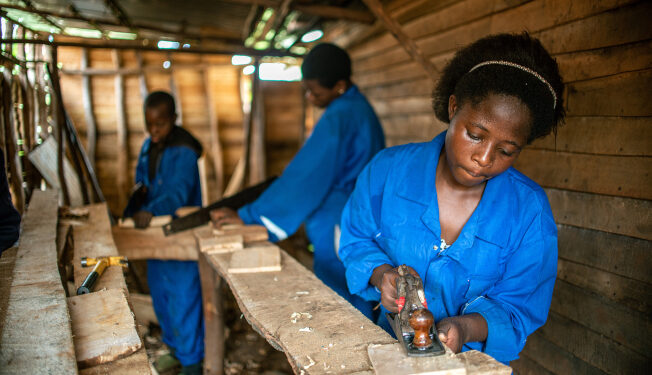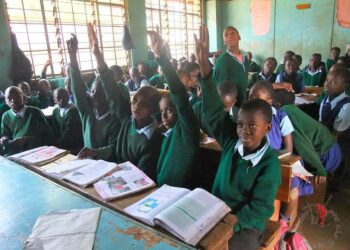The great novelist Chinua Achebe wrote in his novel Things Fall Apart that ‘‘until the lions learn to write, every story will glorify the hunter.’’ Having followed up the TVET calendar week in week out, I hereby share Africa’s top nine TVET highlights. Though not in any order but mindful of the potential impact both in the short and long run.
1. Launch of WorldSkills Africa.
The launch of WorldSkills Africa at the 37th Ordinary session of African Union Assembly in Ethiopia was a strategic move in enhancing Africa’s active participation in global world skills matters. For example, we witnessed an increase in membership of African countries in WorldSkills International, with Nigeria and Ethiopia attending the 47th WorldSkills competition in Lyon, France. WorldSkills Africa remains the champion of member countries on the continent while still tapping into the myriad of opportunities that the WorldSkills International presents in achieving demographic dividend.
2. Africa Skills Week 2024.
The first of its kind on the continent, African Skills Week 2024 hosted in Accra, Ghana enhanced the momentum for skills development on the continent, as global leaders in the TVET sector engaged and shared best practices and policies that could catalyze the sector’s progression. Posts from participants on various social media platforms like LinkedIn and X were testimonies that the event filled a void in the skills development sector and not surprisingly, many participants voiced that the event be made bi-annual one.
3. 3rd Germany-Africa Forum on Vocational Training and Education.
Germany’s dual education system remains a great benchmark for TVET systems on the African continent. The continuous engagement between stakeholders in both Germany and Africa provides a golden opportunity for collaboration and partnerships, which are vital for the success of TVET in Africa. The forum was held in Berlin under the motto “Boasting future skills and partnerships for sustainable growth”.
4. Opening of the Artisan Academy in South Africa.
Artisans constitute a large portion of the continent’s workforce and can play a vital role in its social economic transformation. Opening of an Artisan Academy in Bloemfontein which aims to produce 30,000 artisans by 2030 was a great milestone. Skilling, upskilling and reskilling artisans to meet the evolving needs of the global job market in various sectors is vital for Africa’s economic development. Bravo to the TVET sector in South Africa for prioritizing artisan’s development and this is certainly worth replicating in other African countries.
5. Kenya’s Century of TVET.
Kenya’s TVET stakeholders led by President William Samuel Ruto celebrated 100 years of TVET and together with partners discussed the hits and misses of the century.
Having TVET celebrations led by the president reveals the political will to place TVET on the front burner and the determination to address the negative societal perception about TVET, while also hopefully increasing its budgetary allocation.
6. Edo State Board for TVET hosted the Master Chef Competition during education week.
The tremendous contributions of the Edo State Board for TVET in Nigeria to the success of TVET reflects the benefits of decentralizing TVET. No wonder many TVET Bills like the Uganda TVET Bill 2024 are also putting emphasis on the decentralization of TVET.
7. The Don Bosco Tech Africa Global Program II kicked off in Kenya.
Don Bosco Tech Africa is a major stakeholder in Africa’s TVET sector and beyond with a footprint in 34 countries and a network of 118 TVET centres. The Global Program II kicks off with a workshop themed “Increased opportunities for decent work and improved living standards for young people in sub-Saharan Africa by improving the quality and relevance of vocational training”. It is jointly hosted by Don Bosco Tech Africa and Don Bosco Mondo and it provides better prospects for the TVET sector on the continent.
8. L’École Canadienne de Tunis (ECT) project.
The ground breaking ceremony for the construction of L’École Canadienne de Tunis (ECT) worth millions of dollars in investment in skills development, clearly reflects the contribution of the Chambers of Commerce and partners towards the betterment of TVET in various countries.
The project will have a TVET Centre and an electronic and information technology laboratory to mention just a few.
9. Launch of the World Technical and Vocational Education Training League.
During the inaugural World Vocational and Technical Education conference in China, the TVET league was launched to spearhead development among member countries. With representative countries from the continent as part of the TVET league we look forward to the fruits this will bear for Africa’s TVET.
Theme “Innovation Empowers the Future, skills Enlighten new life”. China’s influence on Africa’s TVET sector is something to follow closely in 2025.
Conclusion.
As the TVET calendar for 2024 gradually folds, shared commitment and dedication from all stakeholders worldwide towards the development and growth of Africa’s TVET have been highly appreciated. Looking forward to TVET in 2025 as calendars are already marked for the 1st quarter with events like the WorldSkills Africa Livingstone competition in Zambia scheduled for 7th – 12th April 2025 to mention a few.
____________________ Mulihi Bumali serves as the country manager of National Careers Week Uganda and team leader Pamoja Careers Services in Uganda He is a professional technical teacher and education specialist from Kyambogo University. He is also a civil engineering technician from Uganda Technical College Bushenyi. He has over 11 years of professional work experience in the field of technical and vocational education and has presented a plethora of career talks in many schools around the country from primary to tertiary institutions. Over the last decade he has championed access to information on careers education, information, advice and guidance, (CEIAG), Technical and Vocational Education Training (TVET) in Uganda and beyond. His professional interests focus on accessibility of career education services and he remains a passionate supporter of initiatives that encourage access to careers education across the globe. Mulihi has over the years received recognition for his outstanding work. He was recognized by the international school of Uganda during the service summit Africa 2009 and also by the International Olympic Committee for his contribution in sport and literature in the same year. Mulihi values the unlimited power of volunteerism as a fulcrum of positive change in communities, which drives him to various volunteering missions especially in the education and TVET sector.



















































































 EduTimes Africa, a product of Education Times Africa, is a magazine publication that aims to lend its support to close the yawning gap in Africa's educational development.
EduTimes Africa, a product of Education Times Africa, is a magazine publication that aims to lend its support to close the yawning gap in Africa's educational development.